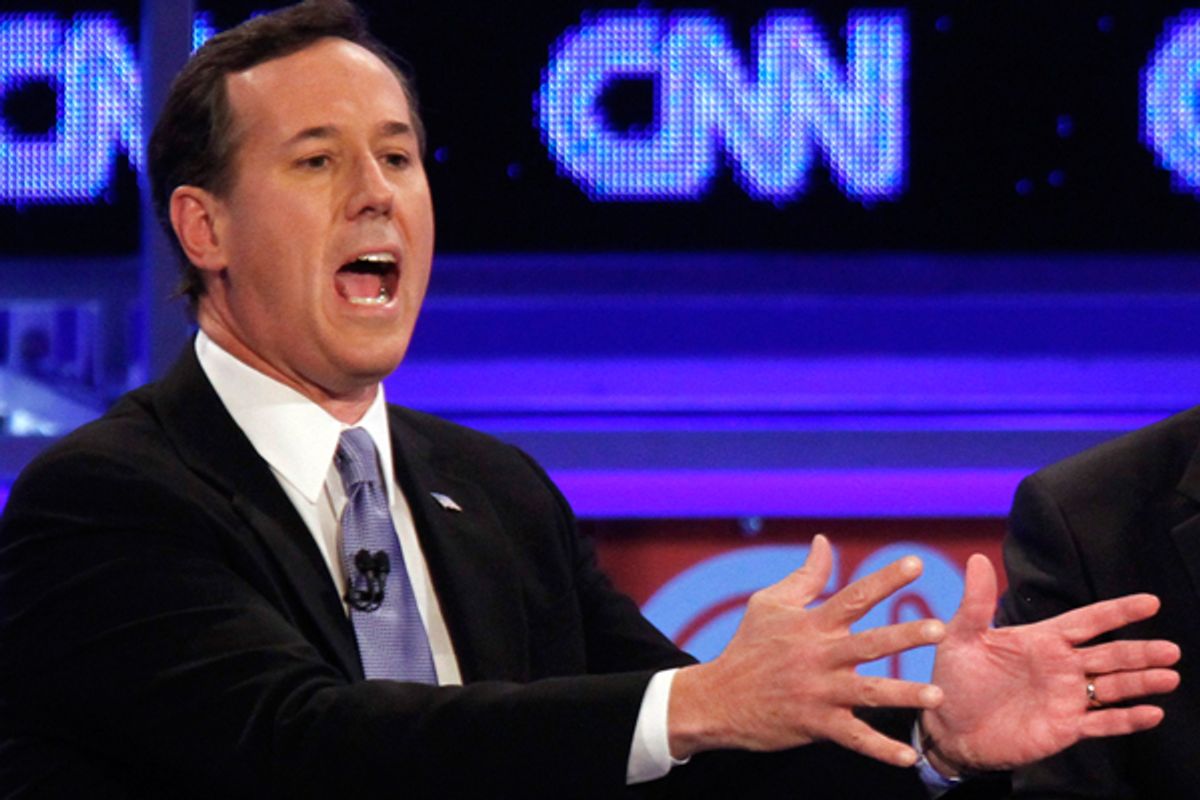Every once in a while, presidential primary campaigns produce moments of almost surreal suspense, when an outcome that was once unimaginable suddenly seems on the verge of happening.
In 1984, for instance, Walter Mondale looked like he had the easiest path to the nomination of any recent candidate, but after a shocking loss to Gary Hart in New Hampshire, he found himself on the brink of being knocked out by a guy who'd been an asterisk in the polls weeks earlier. In 1992, Bill Clinton seemed to have the Democratic nomination in hand, only to suffer a still-inexplicable defeat in Connecticut to Jerry Brown -- which set off talk that Clinton' candidacy would implode and that a new candidate would emerge if he lost the next contest, in New York. And on the Republican side, there was 2000, when John McCain crushed George W. Bush -- who had lined up the most lopsided cash and endorsement advantage ever seen in either party -- in New Hampshire, turning South Carolina into a do-or-die test for Bush.
All of these stories ended the same way: The insurgent candidate fell short in the next major test, order was restored, and the unlikely outcome -- as fun as it was to imagine -- never came to pass. This year's Republican race reached a similar point two weeks ago, when Rick Santorum posted an unexpected three-state sweep in Minnesota, Missouri and Colorado, a result that underscored the party base's lack of enthusiasm for Mitt Romney and sent Santorum's fundraising and poll numbers soaring. Suddenly, two previously far-fetched outcomes came into focus: (1) a primary season that would end without a clear winner and with a deadlocked convention; or (2) the nomination of Santorum.
Thus has Michigan emerged as the key to both possibilities. If Santorum can beat Romney again next Tuesday (this time with Romney spending heavily and attacking him ferociously), it would demonstrate durability and staying power that no other Romney challenger has yet shown -- and it might even cause the bottom to fall out for Romney's campaign. At the very least, it would mean the race for the nomination won't be resolved anytime soon.
But now, as the weekend before Michigan's primary arrives, victory may be slipping away from Santorum. A week ago, he'd opened a clear lead over Romney in the state. But now, four of the five most recent public polls show him trailing or tied with Romney, and the RealClearPolitics average even gives Romney a small lead. What's happened? Well, there's the money. Romney's forces are outspending Santorum's by about 3-to-2 in the state (although that's almost a triumph for Santorum, given how disproportionate the spending was in Florida, where Romney beat back Newt Gingrich).
But the bigger factor may be that Santorum is flunking his audition with Republican opinion-shapers. To succeed where every other Romney foe has failed, Santorum needs help from the GOP's opinion-shaping class -- elected officials, activists, commentators and media personalities whose views tend to shape those of the rank-and-file. Their support could insulate him against attacks from Romney and give his campaign the feel of something bigger, broader and more serious than a niche candidacy. But nothing Santorum has done since his three-state sweep has given them the confidence they'd need to go out on a limb for him.
His red meat culture war rhetoric, which dominated headlines last week and earlier this week, is part of the problem. Just as Republican opinion-shapers were starting to think seriously about what kind of a general election candidate he might make, Santorum showed that that he's incapable of reining in his most polarizing views and speaking in a way that might expand his appeal.
And then there was his debate performance on Wednesday. It seemed possible that Santorum was better equipped to go toe-to-toe with Romney than Gingrich, Herman Cain, or Rick Perry had been -- that he'd be quicker on his feet and more capable of making the basic conservative case against Romney while also fending off his opponents' attacks. But that's not how things played out. Instead, Santorum came across as hesitant and defensive, lapsing over and over again into DC-speak as Romney blasted him for his past support of earmarks, No Child Left Behind and Arlen Specter. Santorum's defense of his No Child Left Behind vote -- "Sometimes, you take one for the team" -- was particularly damaging, and has given Romney a weapon to wield for as long as the campaign lasts. To the casual observer, it seemed like Santorum, and not Romney, was the candidate facing a skeptical party base.
Wednesday night clearly hurt Santorum's standing with GOP elites. The Huffington Post's survey of "Power Outsiders" -- GOP leaders and activists around the country -- found that 44 percent of them judged Romney the winner of the debate, compared to just 15 percent for Santorum. 28 percent picked Gingrich, who's largely been given up for dead as Santorum has surged. And among those who aren't already Romney supporters, 43 percent picked Gingrich as the debate's winner, while only 26 percent pointed to Santorum.
This is a potentially awful development for Santorum. Not only is it further evidence that he's squandering his Michigan opportunity, it also suggests that he may have let Gingrich back in the game. After all, the former House speaker still has some serious financial backing and has shown particular strength with white evangelicals in the South -- voters who Santorum badly needs to fold into his coalition. In other words, if Santorum falls apart in Michigan, he may have to deal with a resurgent Gingrich on Super Tuesday.
The latest poll numbers in Michigan are close and there's still time for Santorum to turn it around. But it's starting to feel like he may have blown his big moment.



Shares